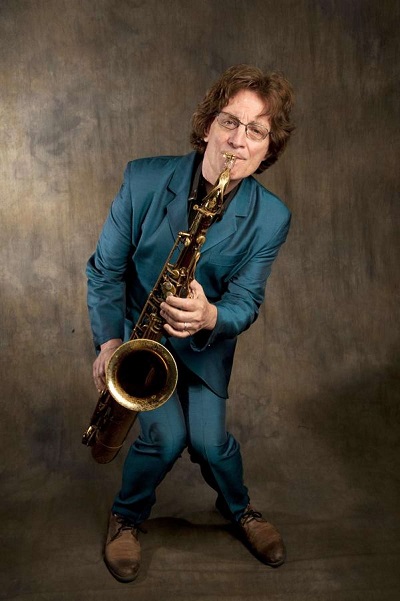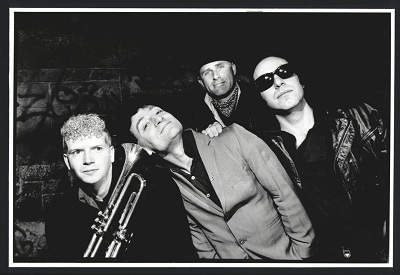
"Uptown Sax" Crispin Cioe Interview
www.CrispinMusic.com
Interview by Roger Zee (07/04/21)
Top Photo by Ahron Foster
Roger Zee: Who inspired you to take up the sax? Do you play any other instruments?
Crispin Cioe: I grew up in Chicago, then briefly in Westchester County, then from twelve years old through college, in the Detroit area, smack dab in the middle of the classic Motown era. I played clarinet in various school bands.
Then in seventh grade, I made a friend named Larry Lamb, already a very good alto sax player who later became a celebrated Detroit woodwind guy. He formed a little band to work school dances and asked me to play clarinet and tenor sax. He had charts for stuff like "Peter Gunn" and "Moon River." Since I never played sax before, he taught me fingerings and we listened to Jazz records at his house. And I became a Jazz aficionado from that point on.
In high school, when the Beatles and Stones first came on the radio, I counter-intuitively formed a Jug band with some friends, including my lifelong best bud, James Montgomery. I played an old tin clarinet from the 30's, washboard, jug, and sang some tunes. But I never considered then that I would end up a "musician."
I went to the University of Michigan in Ann Arbor, studying creative writing and film. But as I neared graduation, I realized that all my best friends were musicians. And I constantly went out to hear music in clubs and concerts. All this in the heyday of Ann Arbor as a major music center for Jazz, Blues, and Rock 'n' Roll.
I had a good friend in college, the late, great Steve Mackay, an art student at U. of M., who had played sax his whole life growing up in Grand Rapids. And his mother played piano in Michigan lounge groups, so he was steeped in Blues and Jazz. His college band, "Carnal Kitchen," performed "out" Jazz and Blues.
About a year after The Stooges formed in Ann Arbor, lead singer Iggy Pop asked MacKay to join the group. Steve really got me interested in playing sax, along with other local monster players like Pete Kahn, who's still a first-call lead alto/woodwind guy for sessions and shows in Detroit today.
Also in my early years, Wayne Kramer, from the MC5, inspired me to keep playing and get serious about it. So, I went to music school at Detroit's Wayne State University for a year, then Berklee in Boston for another. Then returned to Michigan and joined an R&B band called Radio King & His Court of Rhythm, which eventually moved to Boston. I did my first real record date with Detroit Blues-Rocker Catfish Hodge in 1973.
I play all the saxes: tenor/alto/baritone/soprano, plus double on flute and clarinet. My influences on sax come from all over the place.
Jazz-wise: David "Fathead" Newman, Charlie Parker, Sonny Stitt, Coltrane, Mike Brecker, Wilton Felder, Cannonball Adderly, Paul Desmond, Sonny Rollins, Joel Frahm, Eric Alexander, and Bob Malach.
R&B/Rock: King Curtis, Jr. Walker, Lee Allen, Sam Butera, Edgar Winter, Grover Washington Jr., Maceo Parker, David Sanborn, Plas Johnson, and many more.
RZ: Tell me about some of the musicians and groups you've gigged and recorded with.
CC: When I first moved to NYC in the mid-70s, I played in the streets, clubs and bars, and eventually in the studios. I worked my early solo gigs and sessions in town with Carolyne Mas, Steve Forbert, Geoff Muldaur, Dr. Buzzard's Original Savannah Band, The The, Mink DeVille, Peter Ecklund & Paul Lochheart, and Sandy Bull, just to name a few.
In 1980, the owner of Tramp's nightclub, Terry Dunn, asked me to form a house band and host a Tuesday night jam. By this time, I had already met and played for a couple of years with fellow saxist Arno Hecht, often gigging with NYC stalwarts like Blues-meister Jon Paris. Hecht had started an earlier version of the Uptown Horns with trumpeter Paul Litteral, later replaced by Larry Etkin.
By 1979, Arno and Paul worked around town with a couple of groups as The Uptown Horns. Sometimes I would join them on gigs, and sometimes I would get a call to supply horns for various acts coming through Tramps. In 1980, we
decided to band together along with trombonist Bob Funk.
We convinced Tramps to take a small ad out every week in the Village Voice that read, "The Uptown Horns Party, Tuesdays 9pm-?". We did that for three years straight with a rhythm section that included guitarist Marc Ribot, Charlie Giordano on keyboards, Bobby Kent on drums, and bassist David Conrad.
We didn't really do the Tramp's gig as a jam. Instead, we'd invite specific artists down in the afternoon to rehearse whatever they wanted to play that night. But we sort of pretended like these people just showed up and stumbled onstage. After a few months, word caught on about the Tramp's gig.
And we played to packed houses that regularly included folks like famed songwriter Doc Pomus, Atlantic Records and co-founder Jerry Wexler, along with guest stars who would show up to play like Dr. John, Southside Johnny, David Johansen, Elvis Costello, Solomon Burke, Rufus & Carla Thomas, Dennis Coffey, Mike Lawrence, Bullmoose Jackson, Eddie Floyd. Basically anyone who came through town performing concerts.
Then, some of these same folks started asking us to play on live dates and records with them. So during this period, we toured and recorded a live album with Solomon Burke, and studio albums with Iggy Pop, The Nitecaps, Clarence Clemmons, John Waite, and many more. We would do "sectional" rehearsal a few times a week together, and on many nights, just hang out as the Uptown Horns at nightclubs like Danceteria, The Mudd Club, and Limelight.
After three years with this as a steady routine, we hooked up with the mighty J. Geils Band just as their massive hits "Centerfold" and "Freeze-Frame" began climbing the charts. We traveled as their horn section on national tours, and recorded the live album "Showtime" with them.
Throughout the rest of the 80's, we toured/recorded with a motley assortment of acts including Robert Plant & The Honeydrippers, Joe Cocker, Pat Benatar, Bronski Beat, The Communards, James Brown, we played on his big hit "Living in America," Rodney Crowell, Graham Parker, Cameo on "Word Up, "Grandmaster Flash," etc. This all culminated in the Rolling Stones asking us to play with them on their "Steel Wheels" comeback tour in 1989-1990.
RZ: What saxes do you currently play and how do you mic/amplify them?
CC: As noted before, I play all four saxes. On bari, tenor, and alto saxes, I use Selmer Mark VI models and for my soprano, I play a Yamaha. These days, I frequently perform live and record with the great Darlene Love! For her shows, and most others that I do, I use an AMT wireless mic, which sounds great, made by a company in NJ. I pair this up with a TC Helicon VoiceLive Play unit for occasional effects like octave-divider, etc. If performing live with a regular mic, I prefer a Sennheiser 421. In my home studio, I record my horns with a Neumann TLM 103, a killer mic without the big price tag of classic Neumann 87's.
RZ: Talk about what and how you practice.
CC: My practicing evolved over the years. I studied at Wayne State in Detroit with Herb Couf, at Berklee in Boston with Joe Viola, then in NYC with Joe Allard for a short time. And after, more extensively with his protegé, Dave Tofani. All masters who put a heavy emphasis on developing one's tone and personal sound across a lifetime. And I'm still on that quest. That's a constant -- long tones, harmonic studies, etc.
Early on, I also started writing out some of my favorite sax solos by "the masters" and played them over the years as practice pieces. Sometimes I even memorize them as complete solos or specific riffs. I never do this to copy those players, but rather to study their phrasing in twelve keys, again as a mental/aural/dexterity exercise.
I also try to rehearse what I will play for upcoming performances. For a show where I might be featured as a soloist, I tend to treat my solos as set-pieces. I work on polishing and adding new expression and nuance. This, as distinct from other solos which I might approach more as improvisations. So that's two separate approaches. Also these days, I set long-term challenges for myself. For instance, working on improving my sub-tones down low, or expanding my use of circular breathing.
RZ: Do you teach music privately?
CC: I gave lessons in the past, but not so much in recent years since I grew busier playing events and music-directing TV shows with my band "Cracked Ice" and other musical combos.
RZ: How has the Pandemic affected you? What's on the horizon?
CC: During the pandemic, I practiced a lot and greatly expanded my home-recording chops, working a variety of sessions for various projects. I really stretched out and spent time perfecting mic technique for recording my saxes.
Right now, the Uptown Horns are finishing up recording an album project for CT songwriter/bandleader "Hollywood" Steve Gaspar. We virtually and individually recorded over the rhythm section tracks that Gaspar and his band laid down. It sounds very good! And the fact that we persevered with our work during the Pandemic turned into a real morale-booster for us during Covid. I also worked on my songwriting and began preparing another solo album/follow-up to the Cracked Ice album I wrote and recorded a few years ago.
RZ: Describe your most special and/or unusual gig.
CC: I music-directed two concert shows for PBS from the East Room of The White House during President Obama's administration. What an overwhelming honor to play those shows backing performers such as James Taylor, Smokey Robinson, Carole King and Buddy Guy! I'll treasure those experiences forever.
RZ: How do you see the future of the music business?
CC: As long as musicians keep coming up in our world and feel the urge to dig deep and create music that moves people, then I think the music business will continue to prosper! One way or another, great music almost always bubbles up from the streets -- often when and where we least expect it! And my best guess says that the sound of the saxophone will continue to play a part in driving that process.
RZ: What advice do you give up-and-coming musicians?
CC: I can only speak from my own experience. A) Find your own ways to do music. And B) never give up! Keep working towards becoming a better musician and expressing your personal truth!
RZ: Do you live with any animals?
CC: I lived with dogs and cats my entire life. We have a little Corgi now, named Hamlet, who helped us get through the pandemic with his humor and positivity. And he loves music...
YouTube - Living in America (Rocky IV) - James Brown w/Crispin Cioe sax solo
YouTube - Here to Stay - Cracked Ice
©2021 Roger Zee


